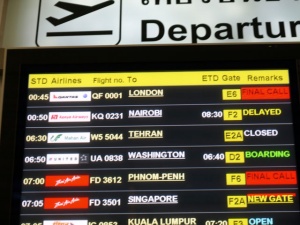UK High Court suspends flight compensation

The High Court in London has suspended the right of UK air passengers to claim compensation from airlines for flight delays.
The decision follows a ruling by the European Court of Justice (ECJ) last November which gave passengers the right to compensation for long delays, in addition to cancellations.
But following a request by UK airlines, the High Court has referred the matter back to the ECJ for a further hearing.
The ruling means that UK courts will hear no further compensation cases until the ECJ rules again.
“The UK has put a stay on new rulings until the ECJ makes another ruling,” James Freemantle of the Air Transport Users’ Council (AUC) told the BBC.
ADVERTISEMENT
“UK courts will not hear any more cases,” he said.
Until last November, European rules awarded airline passengers cash compensation if their flights were cancelled, but not if they were delayed.
If passengers were delayed the airlines had only to offer meals, refreshments, two free telephone calls and, for an overnight delay, hotel accommodation and transfers to and from the hotel.
The new ruling meant that passengers whose flights were delayed should be treated as if their flights had been cancelled, so they would be awarded cash compensation if delays lasted longer than three hours.
BA, Easyjet, TUI and IATA took the matter to the High Court, to persuade it to ask the European court to look at the issue again.
The argument over compensation has been highlighted by the volcanic ash cloud crisis. Some airlines have been fighting their obligation to pay compensation even where there have been clear cut cancellations, not just delays,
Last week, the European Commission threatened to take legal action against KLM which has been reimbursing its passengers for the cost of just one day and one night’s delay.
Ryanair initially threatened not to pay full compensation to its passengers whose flights were cancelled due to the ash cloud, but backed down to pressure from Irish and British authorities.

